What is Rett syndrome?
Rett syndrome is a rare genetic neurological disorder that occurs almost exclusively in girls, more rarely in boys, and leads to severe impairments, affecting nearly every aspect of the child’s life: their ability to speak, walk, eat, and even breathe easily. The hallmark of Rett syndrome is near constant repetitive hand movements. Rett syndrome is usually recognized in children between 6 to 18 months as they begin to miss developmental milestones or lose abilities they had gained.
Rett syndrome is caused by mutations on the X chromosome on a gene called MECP2. There are more than 900 different mutations found on the MECP2 gene, most found in eight different “hot spots.” Rett syndrome is not a degenerative disorder with individuals living to middle age or beyond. Rett syndrome occurs worldwide in 1 of every 10,000 female births and is even rarer in boys. Rett syndrome can present with a wide range of disability ranging from mild to severe. The course and severity of Rett syndrome is determined by the location, type and severity of the mutation and X-inactivation.
Symptoms may include:
- Loss of speech
- Loss of purposeful use of hands
- Involuntary hand movements such as handwashing
- Loss of mobility or gait disturbances
- Loss of muscle tone
- Seizures or Rett “episodes”
- Scoliosis
- Breathing issues
- Sleep disturbances
- Slowed rate of growth for head, feet and hands
Rett Syndrome CME Opportunities
For pediatricians, neurologists, or anyone involved in the treatment of patients with Rett syndrome.
Register for the below for these FREE continuing medical education (CME) opportunities. Learn about Rett syndrome from diagnosis to care and treatment from a panel of experts and parents of children with Rett.
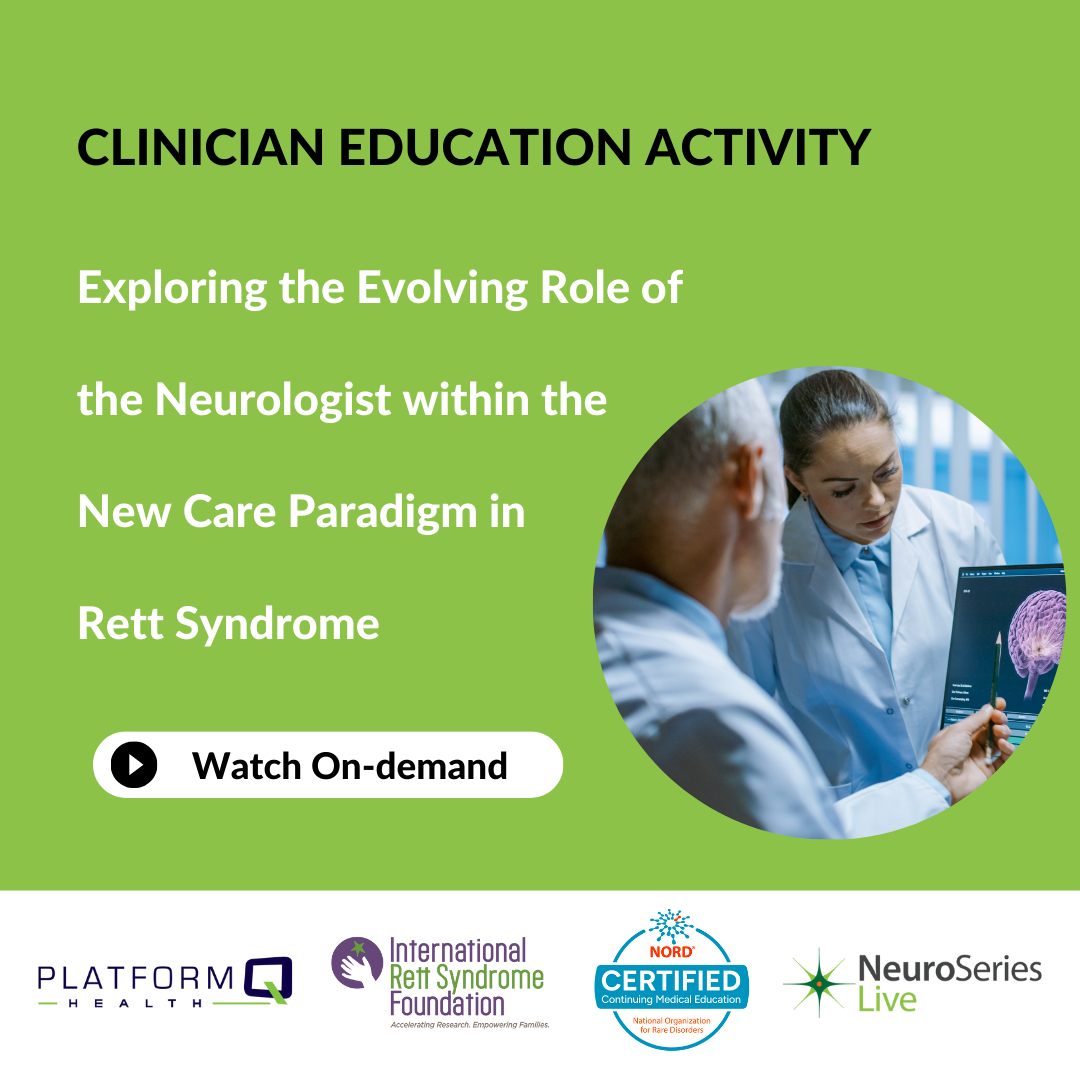 Newer therapies are now available for the treatment of Rett syndrome, but questions remain about how to integrate them into care, particularly in community-based settings. Join an expert panel – featuring a neurologist from an International Rett Syndrome Foundation (IRSF)-designated Rett syndrome center of excellence, a community-based neurologist, and a patient advocate from IRSF who will elucidate the central role of the neurologist in the care of patients with Rett syndrome. The panel will describe how to recognize and diagnose Rett syndrome and explore the latest findings on newly available treatment options and their place in team-based care. Case-based discussions will highlight strategies to overcome challenges faced by community-based clinicians and provide guidance for neurologists initiating treatment and working with the greater care team to monitor and manage adverse events, as well as when and how to refer patients to centers of excellence. This activity is the first in a larger three-part educational initiative aimed at bettering outcomes for patients with Rett syndrome.
Newer therapies are now available for the treatment of Rett syndrome, but questions remain about how to integrate them into care, particularly in community-based settings. Join an expert panel – featuring a neurologist from an International Rett Syndrome Foundation (IRSF)-designated Rett syndrome center of excellence, a community-based neurologist, and a patient advocate from IRSF who will elucidate the central role of the neurologist in the care of patients with Rett syndrome. The panel will describe how to recognize and diagnose Rett syndrome and explore the latest findings on newly available treatment options and their place in team-based care. Case-based discussions will highlight strategies to overcome challenges faced by community-based clinicians and provide guidance for neurologists initiating treatment and working with the greater care team to monitor and manage adverse events, as well as when and how to refer patients to centers of excellence. This activity is the first in a larger three-part educational initiative aimed at bettering outcomes for patients with Rett syndrome.
This activity is jointly provided by Global Education Group and PlatformQ Health Education, LLC, in collaboration with the National Organization for Rare Disorders, Inc. (NORD) and International Rett Syndrome Foundation. This activity is supported by an independent educational grant from Acadia Pharmaceuticals Inc.
This activity was released on February 27, 2024, and is valid until February 27, 2025. Requests for credit must be made no later than February 27, 2025.
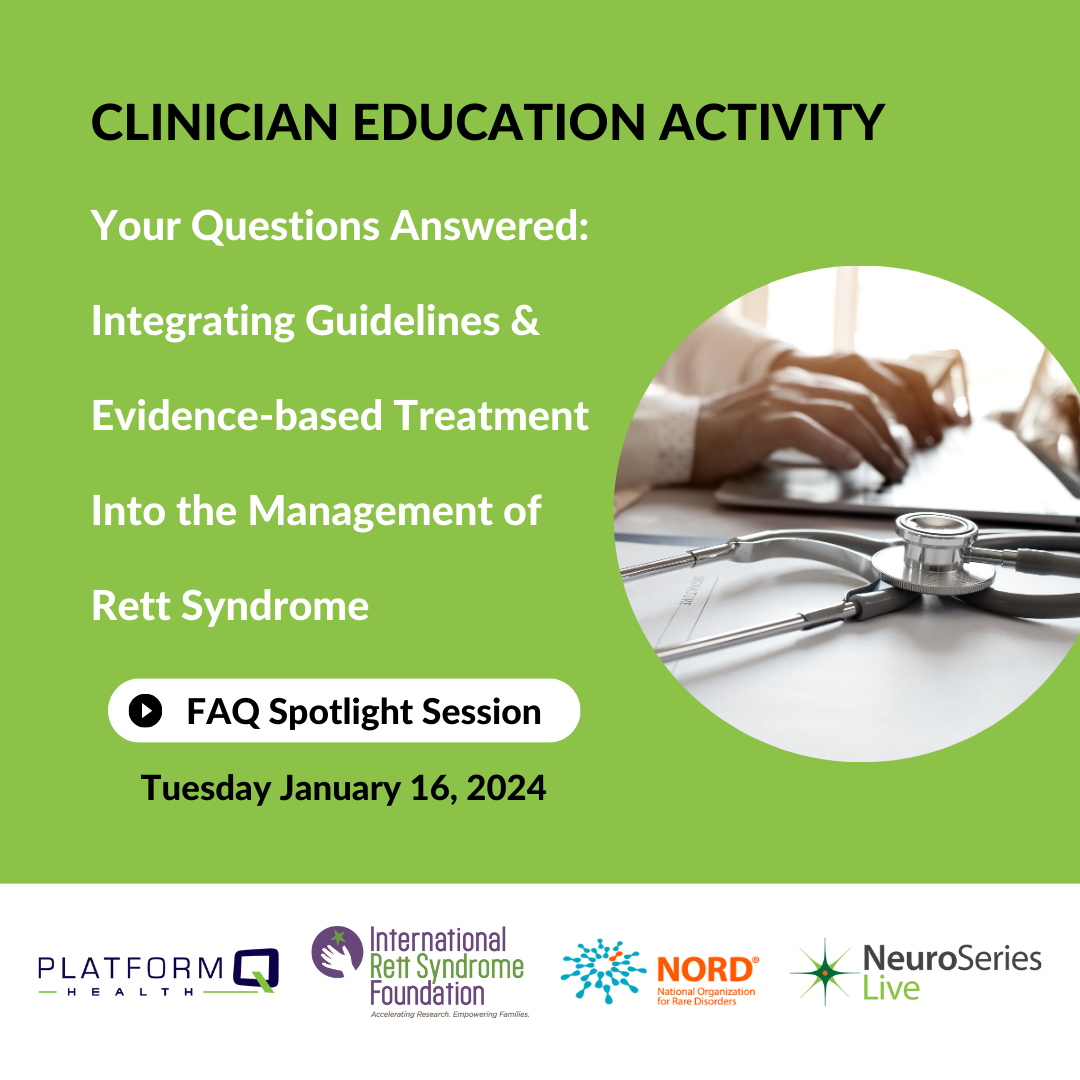 Have lingering unanswered questions about Rett syndrome, its diagnosis, and appropriate treatment? Join us for a special “FAQ Spotlight” session designed to answer frequently asked clinician questions and provide updated information on the management of Rett syndrome. Join David Lieberman, MD, PhD and Arthur A. Beisang III, MD will lead the session based on questions gathered during previous CME activities on Rett Syndrome.
Have lingering unanswered questions about Rett syndrome, its diagnosis, and appropriate treatment? Join us for a special “FAQ Spotlight” session designed to answer frequently asked clinician questions and provide updated information on the management of Rett syndrome. Join David Lieberman, MD, PhD and Arthur A. Beisang III, MD will lead the session based on questions gathered during previous CME activities on Rett Syndrome.
This free CME activity is jointly provided by Partners for Advancing Clinical Education (PACE) and PlatformQ Health Education, LLC, in collaboration with the National Organization for Rare Disorders (NORD), and the International Rett Syndrome Foundation (IRSF).
This activity was released on January 16, 2024, and is valid until January 16, 2025. Requests for credit must be made no later than January 16, 2025.
Recognizing Rett syndrome among pediatric providers is critical especially when the first disease specific therapy now becomes available. How Rett syndrome differs from autism and how loss of acquired speaking or hand skills in young children should trigger the suspicion of the disease will be discussed.
Upon completion of this activity, participants should be able to:
- Inquire about loss of acquired speaking or hand skills in 1 to 4-year-old children with developmental stagnation.
- Apply the diagnostic criteria of Rett syndrome to children with loss of acquired speaking or hand skills.
- Manage issues involved in the diagnosis such as differentiating Rett syndrome from autism.
This activity is jointly provided by P2P Syncro and Postgraduate Institute for Medicine. This activity is supported in by an independent education grant from Acadia Pharmaceuticals.
In support of improving patient care, this activity has been planned and implemented by the Postgraduate Institute for Medicine and P2P Syncro. Postgraduate Institute for Medicine is jointly accredited by the Accreditation Council for Continuing Medical Education (ACCME), the Accreditation Council for Pharmacy Education (ACPE), and the American Nurses Credentialing Center (ANCC), to provide continuing education for the healthcare team.
This activity was released on December 21, 2023, and is valid until December 21, 2024.
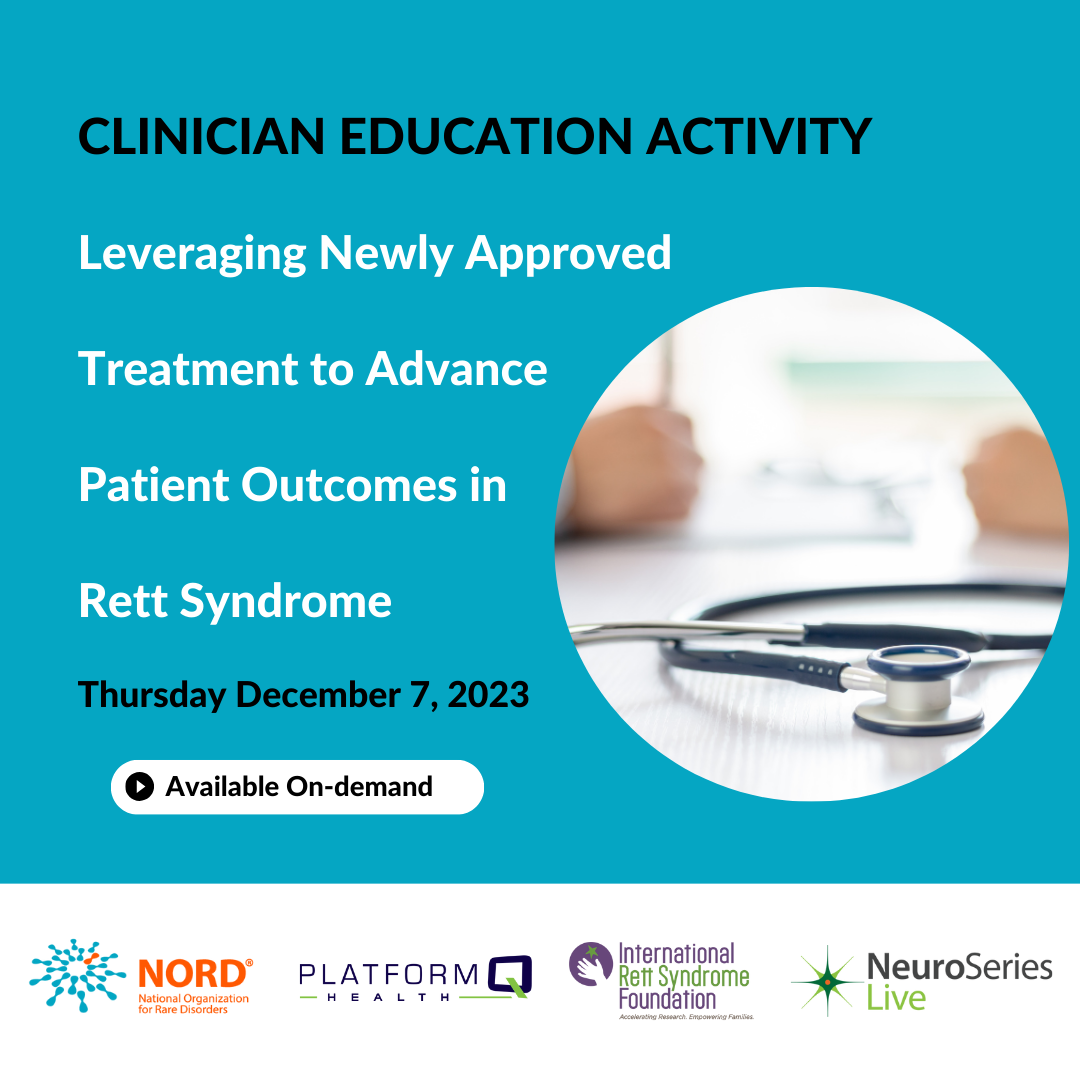 Join David Lieberman, MD, PhD and Arthur A. Beisang III, MD for this 2-part series on the diagnosis and treatment of Rett syndrome.
Join David Lieberman, MD, PhD and Arthur A. Beisang III, MD for this 2-part series on the diagnosis and treatment of Rett syndrome.
Session 1: Strategies for Early Diagnosis and Treatment in Rett Syndrome
Learn how to identify the early signs and symptoms of Rett syndrome, improve diagnoses, and recognize the role of genetic testing in diagnosis.
Session 2: Applying Guideline-recommended Multidisciplinary Care and Evidence-based Agents for the Management of Rett Syndrome
The panel discusses treatment selection, integration of newly approved agents, and the place of multidisciplinary care in the evolving management of Rett syndrome. They will cover available options for managing symptoms of Rett syndrome (gastrointestinal dysfunction, epilepsy, and physical and communication deficits), along with solutions to manage adverse events associated with therapy.
This free CME activity is jointly provided by Partners for Advancing Clinical Education (PACE) and PlatformQ Health Education, LLC, in collaboration with the National Organization for Rare Disorders (NORD), and the International Rett Syndrome Foundation (IRSF).
This activity was released on December 7, 2023, and is valid until January 16, 2025. Requests for credit must be made no later than January 16, 2025.
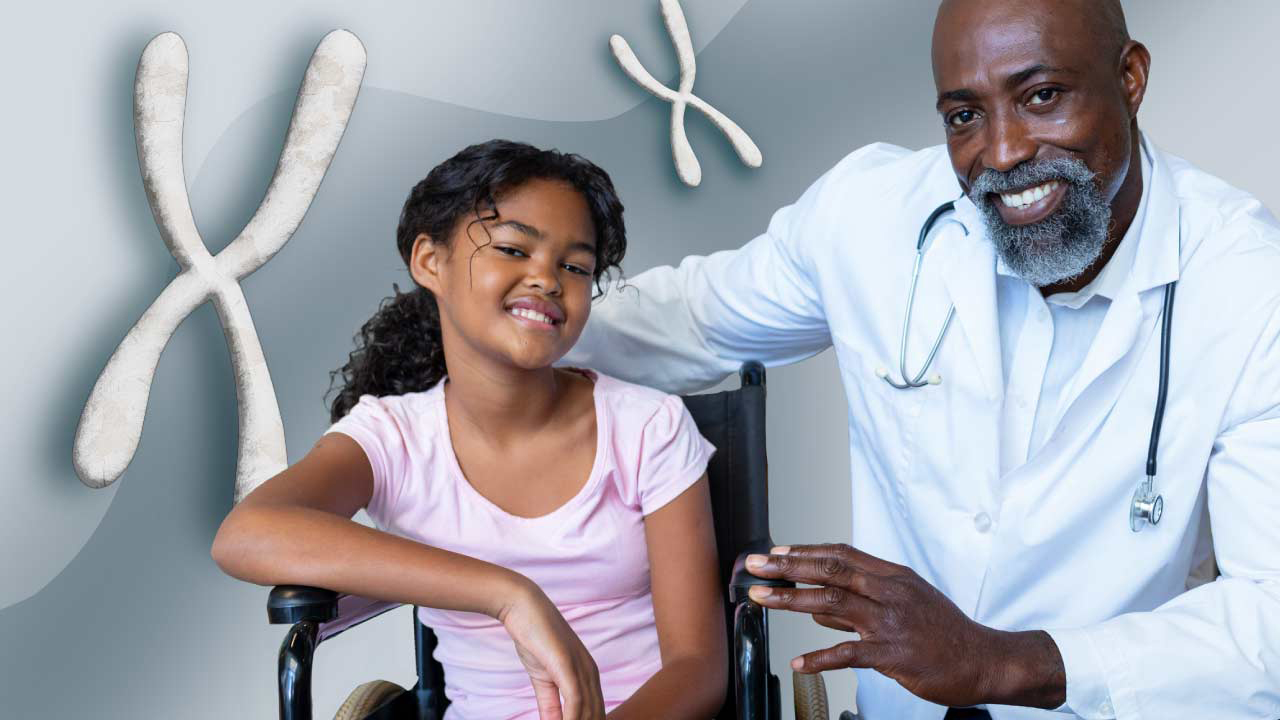 Rett syndrome (RTT) is associated with a spectrum of subtle symptoms, many of which manifest during specific ages during a child’s development. Delayed diagnosis of RTT is very common. The inability to differentiate the subtle signs of RTT impedes a proper diagnosis and delays medical interventions desperately needed for positive patient outcomes. Recognizing the subtle symptoms and deploying the multidisciplinary healthcare team earlier is vital in improving patient quality of life and decreasing psychosocial stress.
Rett syndrome (RTT) is associated with a spectrum of subtle symptoms, many of which manifest during specific ages during a child’s development. Delayed diagnosis of RTT is very common. The inability to differentiate the subtle signs of RTT impedes a proper diagnosis and delays medical interventions desperately needed for positive patient outcomes. Recognizing the subtle symptoms and deploying the multidisciplinary healthcare team earlier is vital in improving patient quality of life and decreasing psychosocial stress.
The desired outcome of this educational initiative is to help the multidisciplinary team understand the circumstances that impede an early diagnosis, improve the ability to recognize and diagnose the subtle signs and symptoms of RTT earlier, impart best practices in deploying the multidisciplinary team, and raise the awareness of current and emerging therapeutics used to manage RTT.
In support of improving patient care, this free activity has been planned and implemented by Global Learning Collaborative (GLC) and TotalCME, Inc. GLC is jointly accredited by the American Council for Continuing Medical Education (ACCME), the Accreditation Council for Pharmacy Education (ACPE) and the American Nurses Credentialing Center (ANCC) to provide continuing education for the healthcare team.
This activity was planned by and for the healthcare team, and learners will receive 1.0 Interprofessional Continuing Education (IPCE) credit for learning and change.
This activity was released on May 26, 2023, and is valid until May 26, 2024.
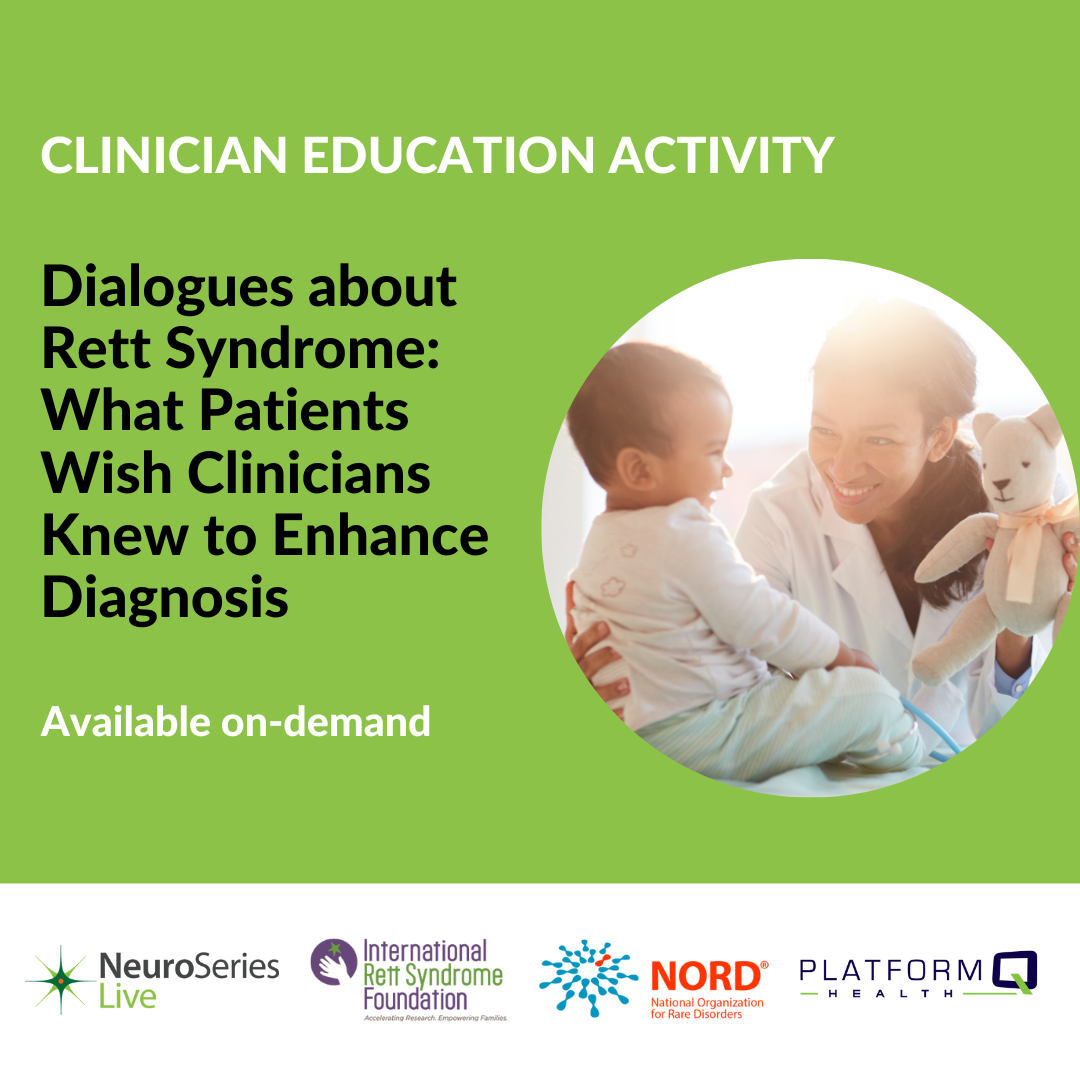 Even after the onset of symptoms, a diagnosis of Rett syndrome is often delayed by 12 months or more. Improving outcomes for patients with Rett syndrome depends upon improving accurate and timely diagnoses and individualizing treatments based on each patient’s needs and comorbidities. As agents to treat the core symptoms of Rett syndrome are advancing in clinical trial development, with a promising agents expected to be approved by the US FDA in early 2022, early diagnosis is becoming of the utmost importance to ensure access to these breakthrough agents.
Even after the onset of symptoms, a diagnosis of Rett syndrome is often delayed by 12 months or more. Improving outcomes for patients with Rett syndrome depends upon improving accurate and timely diagnoses and individualizing treatments based on each patient’s needs and comorbidities. As agents to treat the core symptoms of Rett syndrome are advancing in clinical trial development, with a promising agents expected to be approved by the US FDA in early 2022, early diagnosis is becoming of the utmost importance to ensure access to these breakthrough agents.
Join a panel of neurology and pediatric specialists, as well as a patient advocate, to explore ways to reduce the time to diagnosis by recognizing early signs of Rett syndrome, understanding the place of genetic testing, and asking questions to gauge patient/caregiver experiences. Panelists will discuss strategies to ensure patients and caregivers understand the available and emerging treatment options for Rett syndrome, the latest clinical findings, and the importance of multidisciplinary care. Clinicians will be prepared to facilitate access to breakthrough therapies and improve quality of life for their patients with Rett syndrome.
This activity is jointly provided by Global Education Group and PlatformQ Health Education, LLC, in collaboration with the National Organization for Rare Disorders, Inc. (NORD) and International Rett Syndrome Foundation.
This activity was released on February 17, 2023 and is valid until February 17, 2024. Requests for credit must be made no later than February 17, 2024.